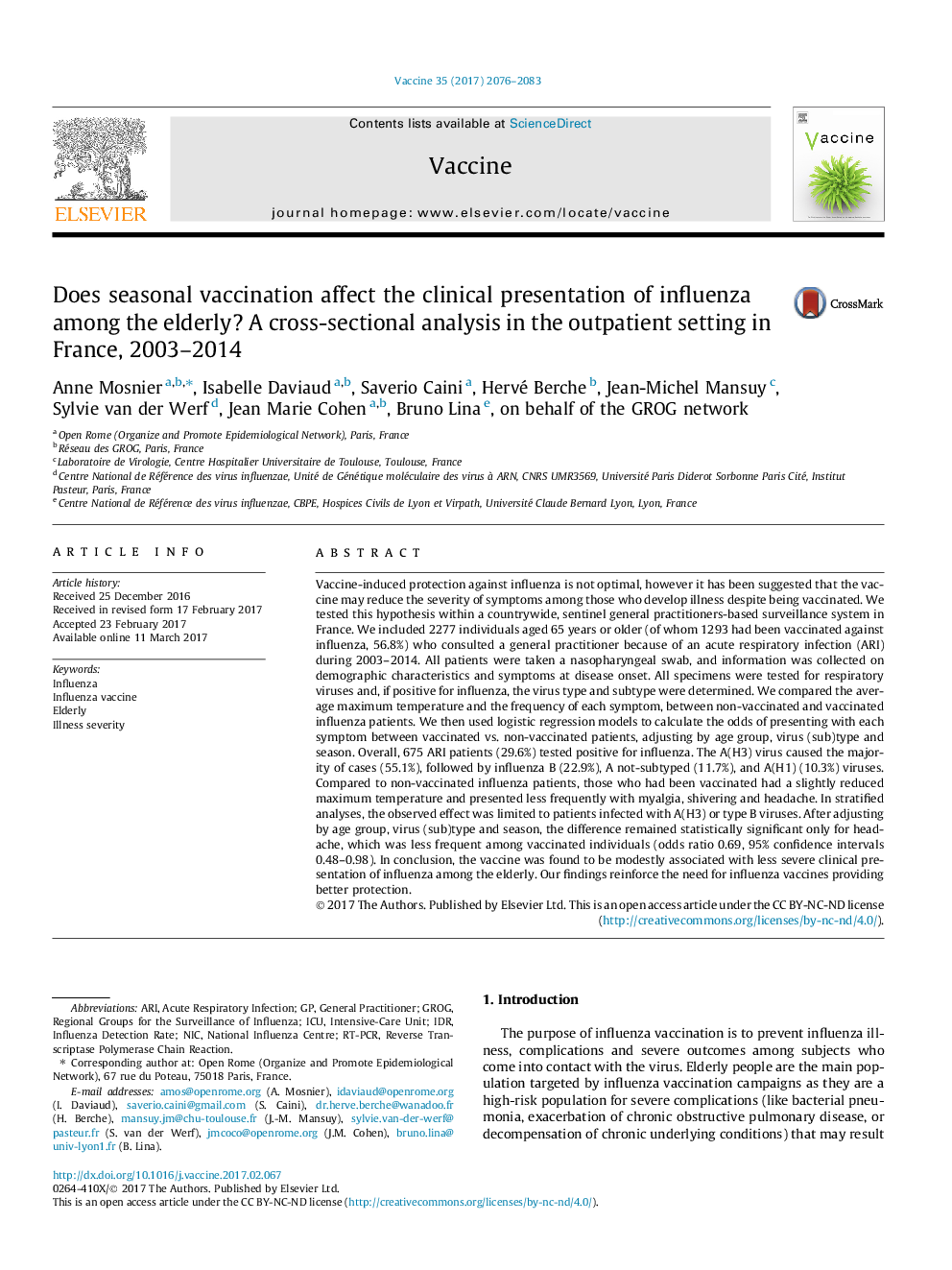| کد مقاله | کد نشریه | سال انتشار | مقاله انگلیسی | نسخه تمام متن |
|---|---|---|---|---|
| 5537142 | 1402322 | 2017 | 8 صفحه PDF | دانلود رایگان |
عنوان انگلیسی مقاله ISI
Does seasonal vaccination affect the clinical presentation of influenza among the elderly? A cross-sectional analysis in the outpatient setting in France, 2003-2014
ترجمه فارسی عنوان
آیا واکسیناسیون فصلی بر ارائه بالینی آنفلوآنزا در سالمندان تاثیر می گذارد؟ تجزیه و تحلیل مقطعی در زمینه سرپایی در فرانسه، 2003-2014
دانلود مقاله + سفارش ترجمه
دانلود مقاله ISI انگلیسی
رایگان برای ایرانیان
کلمات کلیدی
RT-PCRARIIDRNational Influenza CentreInfluenza - آنفلوانزا ICU - بخش مراقبتهای ویژهElderly - سالمندیIllness severity - شدت بیماریAcute respiratory infection - عفونت حاد تنفسیintensive-care unit - واحد مراقبت های ویژهinfluenza vaccine - واکسن آنفلوآنزاreverse transcriptase polymerase chain reaction - واکنش زنجیره ای پلی مراز ترانس کریتاز معکوسGeneral practitioner - پزشک عمومیNIC - چیزی
موضوعات مرتبط
علوم زیستی و بیوفناوری
ایمنی شناسی و میکروب شناسی
ایمونولوژی
چکیده انگلیسی
Vaccine-induced protection against influenza is not optimal, however it has been suggested that the vaccine may reduce the severity of symptoms among those who develop illness despite being vaccinated. We tested this hypothesis within a countrywide, sentinel general practitioners-based surveillance system in France. We included 2277 individuals aged 65Â years or older (of whom 1293 had been vaccinated against influenza, 56.8%) who consulted a general practitioner because of an acute respiratory infection (ARI) during 2003-2014. All patients were taken a nasopharyngeal swab, and information was collected on demographic characteristics and symptoms at disease onset. All specimens were tested for respiratory viruses and, if positive for influenza, the virus type and subtype were determined. We compared the average maximum temperature and the frequency of each symptom, between non-vaccinated and vaccinated influenza patients. We then used logistic regression models to calculate the odds of presenting with each symptom between vaccinated vs. non-vaccinated patients, adjusting by age group, virus (sub)type and season. Overall, 675 ARI patients (29.6%) tested positive for influenza. The A(H3) virus caused the majority of cases (55.1%), followed by influenza B (22.9%), A not-subtyped (11.7%), and A(H1) (10.3%) viruses. Compared to non-vaccinated influenza patients, those who had been vaccinated had a slightly reduced maximum temperature and presented less frequently with myalgia, shivering and headache. In stratified analyses, the observed effect was limited to patients infected with A(H3) or type B viruses. After adjusting by age group, virus (sub)type and season, the difference remained statistically significant only for headache, which was less frequent among vaccinated individuals (odds ratio 0.69, 95% confidence intervals 0.48-0.98). In conclusion, the vaccine was found to be modestly associated with less severe clinical presentation of influenza among the elderly. Our findings reinforce the need for influenza vaccines providing better protection.
ناشر
Database: Elsevier - ScienceDirect (ساینس دایرکت)
Journal: Vaccine - Volume 35, Issue 16, 11 April 2017, Pages 2076-2083
Journal: Vaccine - Volume 35, Issue 16, 11 April 2017, Pages 2076-2083
نویسندگان
Anne Mosnier, Isabelle Daviaud, Saverio Caini, Hervé Berche, Jean-Michel Mansuy, Sylvie van der Werf, Jean Marie Cohen, Bruno Lina, on behalf of the GROG network on behalf of the GROG network,
